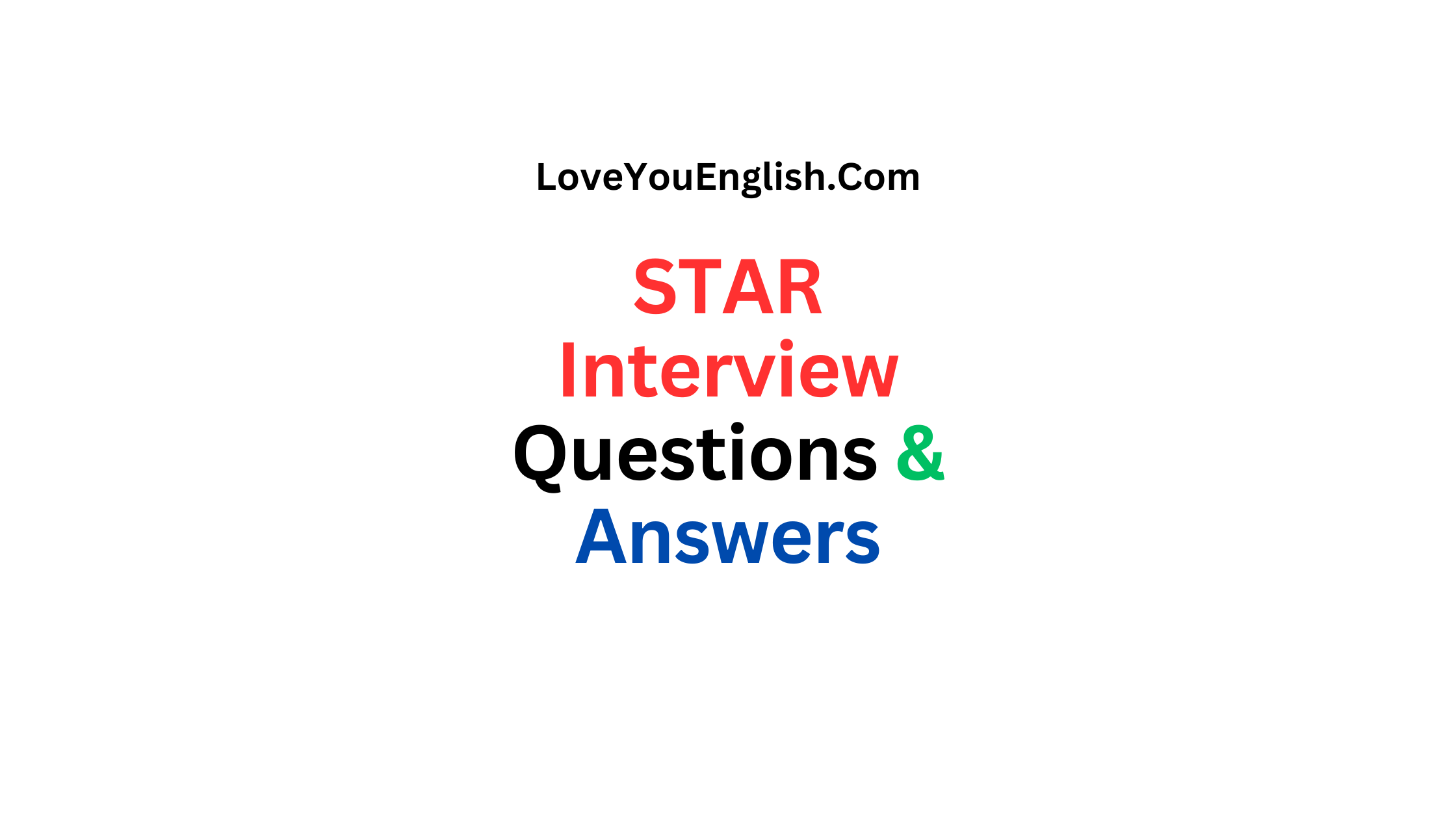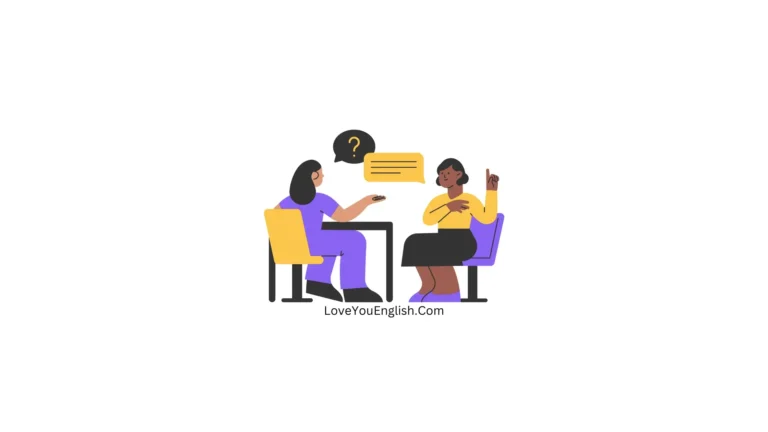STAR Interview Questions and Answers
STAR Interview Questions and Answers
Job interviews can be really stressful, but if you prepare well, you can feel confident and ready to impress your future boss.
A common technique many companies like to use is the STAR method.
I will tell you what STAR interview questions are, why they’re important, and how you can use the STAR method to give awesome answers that could help you get your dream job.
What is the STAR Method?
STAR stands for Situation, Task, Action, and Result.
It’s a way to organize your answers to interview questions that focus on your past experiences and what you’ve done.
By using this method, you can provide clear, straightforward, and impressive answers that highlight your skills and strengths.
Let’s break down each part of STAR:
Situation: This is where you describe the setting and give some background to your story.
What was going on?
Where were you?
When did this happen?
Task: In this part, you explain what you were supposed to do in that situation.
What was your job?
What did people expect from you?
Action: This is the most crucial part. You talk about what you actually did to handle the situation or finish the task.
What steps did you take?
How did you solve the problem?
Result: Finally, you explain what happened because of your actions.
What was the outcome of what you did?
How did it help your team or company?
Employers ask STAR questions for a few important reasons:
- They want to know about your real-life experiences: By focusing on specific situations, employers can understand how you dealt with challenges before.
- They can evaluate your skills: Your responses reveal what abilities you have and how you apply them in real-life scenarios.
- They can predict how you might act in the future: Your past actions can give employers clues about how you might respond in similar situations later on.
- They can fairly compare different candidates: By asking the same questions to everyone, employers can easily see how different applicants stack up against each other.
Common STAR Interview Questions
Here are some typical STAR interview questions you might face:
- Share a time when you had to work under pressure.
- Describe a situation where you solved a tough problem.
- Give an example of when you motivated others.
- Tell me about a time you dealt with a challenging customer or coworker.
- Describe a project that required teamwork.
- Share an example of when you demonstrated leadership.
- Tell me about a time you had to meet a strict deadline.
- Describe a situation where you quickly learned something new.
- Give an example of a tough decision you had to make.
- Tell me about a time you failed at something and how you dealt with it.
How to Answer STAR Questions
Now that we understand what STAR questions are, let’s explore how to answer them well:
Get ready ahead of time:
Reflect on your past experiences and think of a few stories that highlight different skills and situations you’ve faced.
Pick the right examples:
- Ensure your stories relate to the job you’re applying for. If you can, choose examples from similar jobs or fields.
- Be detailed: Avoid giving vague answers. Use specific details to clearly explain the situation and what you did.
- Stay brief: While it’s important to provide enough information, try to keep your answer around 2-3 minutes long. Practice your stories to make sure you can share them smoothly.
- Highlight your contribution: Even if it was a group effort, make sure to emphasize what you specifically did and how you helped.
- Show results with numbers: If you can, use statistics or percentages to demonstrate the impact of your actions.
- Be truthful: Don’t stretch the truth or invent stories. Interviewers can usually tell when someone isn’t being honest.
More cool topics:
- Managing Stress & Anxiety in Job Interviews
- Discussing Salary in the Interview Process
- How To Improve Business English: Tips and Strategies for Success
- How to Write an Interview Thank You Email [Tips + Examples]
- 15 Top Qualities Employers Look For in Job Candidates
STAR Answer Examples
Let’s check out example STAR answer to see how to organize your responses:
Question 1: Can you describe a time when you had to work under pressure?
Situation: “In my last job as a marketing coordinator, we had a big product launch planned for the end of the quarter. Just two weeks before the launch, our team leader got sick and had to take time off.”
Task: “Since I was the most experienced member of the team, I was asked to step up and lead the launch preparations to make sure everything was ready on time.”
Action: “I quickly set up a team meeting to see where we stood in the process. I assigned tasks based on each person’s strengths and arranged daily check-ins to keep track of our progress. I also worked late several nights to go over all the marketing materials and coordinate with the product team to ensure everything was correct.”
Thanks to our dedication and planning, we successfully launched the product right on time. The launch turned out to be a big hit, with sales in the first month surpassing our target by 20%. My manager was really impressed with how I managed the stress and later suggested me for a promotion to team lead.
In my job as a customer service rep at a software company, we suddenly got a lot of complaints about a bug in our latest update that was making the app crash for some users. My responsibility was to address these complaints, find solutions for the customers affected, and inform our development team about the issue.
I started by making a standard reply to let customers know we were aware of the problem and were working on it. Then, I looked through the complaints to find out when the crashes were happening. I found out that the bug only impacted users with older devices. I teamed up with the tech support crew to create a temporary fix for those users. In the end, I put together a detailed report for the development team, including the fix and all the information I had collected about the bug.
The development team used my report to quickly find and fix the bug. We managed to release a patch within 48 hours. The temporary fix I created helped lessen the negative reviews during that time, and many customers specifically complimented our fast and helpful response to the problem.
I was leading a team on a long-term project to redesign our company’s website. After three months of work, the team was feeling down because we were behind schedule and dealing with a lot of technical issues.
As the leader of the team, it was my job to lift everyone’s spirits and get our project back on track.
To do this, I planned a fun day outside the office for team bonding. We kicked things off with some enjoyable activities to strengthen our team spirit, followed by a brainstorming session to tackle our problems.
I made sure that everyone had a chance to share their thoughts and that their ideas were appreciated. We broke our remaining tasks into smaller, easier parts and set achievable goals. Plus, I arranged for pizza to be delivered to the office every Friday as a little treat for our hard work.
The outcome was amazing! The team’s energy and motivation shot up. We started hitting our new goals regularly, and everyone worked together much better.
We finished the website redesign just one week after our original deadline, which was a big win considering how behind we had been. The project turned out great, and the new website boosted user engagement by 35%.
Tips for STAR Interview Success
Now that you’ve seen some examples, here are some extra tips to help you ace STAR interview questions:
- Keep practicing: The more you practice sharing your stories, the more confident and natural you’ll feel during the interview.
- Have different examples ready: Try to prepare stories that highlight various skills and situations. This way, you’ll be ready for a wide range of questions.
- Customize your answers: Research the company and the job description before the interview. Choose examples that show skills and qualities that are especially important for the role.
- Use “I” statements: While it’s good to recognize teamwork, make sure to emphasize your personal contributions and actions.
- Demonstrate your progress: Whenever you can, share examples that illustrate how you’ve grown from your experiences or how you’ve improved over time.
- Be prepared for follow-up questions: The interviewer may want to know more about your story, so be ready to give extra details if they ask.
- Keep a positive attitude: Even if you’re talking about a tough situation, try to highlight the good things, like what you learned or how you managed to get through it.
- Use the STAR method for tricky questions: Even if a question isn’t a typical behavioral one, you can still use the STAR method to organize your response.
- Maintain professionalism: While your examples should come from your personal life, ensure they are suitable for a work environment.
- Finish strong: Make sure the “Result” part of your answer highlights your success or what you gained from the experience.
Common Mistakes to Avoid
While the STAR method can really help your interview answers, there are some common pitfalls to watch out for:
Going off-topic: Stick to the important details and keep your answer short and to the point.
Not addressing the question: Ensure your story actually answers the question being asked. It’s easy to get sidetracked and forget what you were supposed to answer.
Using bad examples: Stay away from stories that might make you look bad, even if they ended well.
Leaving out the outcome: Always include what happened as a result of your actions; don’t leave your story unfinished.
Reusing the same story: Try to have different examples ready so you don’t keep telling the same one.
Exaggerating or being dishonest: Be truthful about your experiences and achievements. Most interviewers can tell when someone is not being genuine.
Not giving yourself enough credit: While it’s great to recognize teamwork, make sure you also highlight what you personally contributed.
Focusing too much on the background: While it’s important to set the scene, most of your answer should focus on what you did and the results you achieved.
Illustrate your development: Whenever you can, provide examples that show how you’ve learned from your experiences or how you’ve grown over time.
Be ready for follow-up inquiries: The interviewer might ask for more details about your story, so be prepared to share additional information if necessary.
Stay optimistic: Even if you’re discussing a difficult situation, try to emphasize the positive aspects, like what you learned or how you managed to overcome the challenge.
Wrapping it Up
STAR interview questions might look tough at first, but they’re actually a fantastic chance to show off what you can do.
By using the STAR method to organize your answers, you can give clear, short, and impressive responses that will catch your interviewer’s attention.
The secret to nailing STAR questions is all about getting ready.
Spend some time before your interview thinking about your past experiences and how they highlight your skills.
Practice sharing your stories in a way that’s easy to follow and interesting.
When you’re in the interview, pay close attention to the questions and take a moment to pick the best example from your stories.
If you’re unsure about what the interviewer wants, don’t hesitate to ask for more details.
Most importantly, be yourself and let your true self come through.
While the STAR method helps you organize your answers, it’s your unique experiences and viewpoint that will make you memorable as a candidate.
With some practice and preparation, you’ll be all set to handle any STAR interview question that comes your way.






